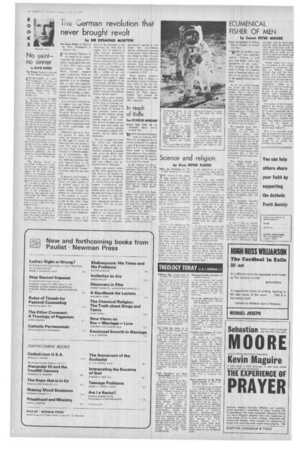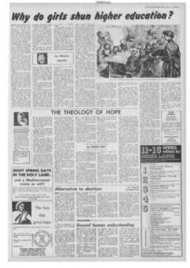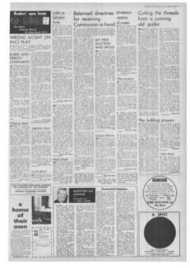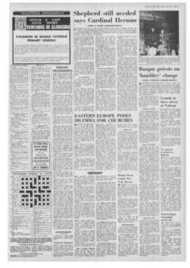Page 6, 24th October 1969
Page 6

Report an error
Noticed an error on this page?If you've noticed an error in this article please click here to report it.
Tags
Share
Related articles
The Path To Tower Hill
Lord Fisher One Of The Old School
Perfectionist Among Reformers
Less Of The Travelogue, More Of The Man
"we Want More Hostels For Boys"
Reporter At Large (2)
ECUMENICAL FISHER OF MEN
by Canon PETER MOORE
Fisher of Lambeth by William
tj Purcell 50s.) rc5e011 (Hodder & Stough " 'WHO is Geoffrey Can tuar?' One small boy replied: `Cantuar is half man, half horse.' Not a bad description of me, really." This anecdote on the title page of Fisher of Lambeth gives a thumbnail sketch, not only of its subject but also of the general impression he made.
As we are carried through the events and left almost breathless at the end of each chapter, there is the distinct sense that the Archbishop was taking things very much in his stride. And of course he was, with a physical resilience and mental alertness which left many of his contemporaries far behind. And if, like me, you search these pages for those en dearing foibles which humanise the great, you will search in vain. Geoffrey Fisher, when he felt he could take time off. did his own tax returns!
His progress from Marlborough, via Repton, to Lambeth is here told in
fascinating detail. And although from time to time the craft of the tape-recorder is more evident than that of the writer, it does give an authenticity to the record which most biographies, written only after the death of their subject, must necessarily lack. I will not choose between the many anecdotal pearls.
Three things emerge from this biography with great clarity. Although Archbishop Fisher is our contemporary, he does belong to an epoch which had different premises from our own. He lived in an age of certitudes, and these certitudes ruled and ordered his own life in such a way that from time to time removed him from touch with the present scene. Perhaps this was the greatest single factor in his not always happy relationship owith the national press.
These certitudes, secondly, could be limitations quite as much as advantages. Ultimately their presence accounts for the accusation of being still a headmaster which followed the Archbishop to Chester, London and Canterbury.
In fact it was an attitude neatly summarised by Canon Purcell in his chapter on Repton where, recounting difficulties that the young head had with certain of his staff, he wrote "He consulted no one in the school. Discussion could
not help: only he could judge precisely when the decision to end this experiment could he made. And when the moment came when he could act he seized it with both hands, and was perfectly clear what the action should be."
Thirdly, Fisher must always be rememberd as the worthy successor in ecumenical venture to William Temple. Temple had laid the foundations, and Geoffrey Fisher did not, as it were. leave them to grow moss. He initiated conversations, not only with the conformists, largely as a result of his famous Cambridge Sermon in 1946, but also, and in, view of his probable prejudices, most unexpectedly, with the Church of Rome by his visit to the Holy Father in 1960.
For readers of the Cierieouc HERALD the chapter entitled Final Journeys will probably be the most interesting one in the book. (One must presume that "Cathedral" on line three of page 148 is a misprint and not a long hidden ecumenical foray. As the subject is Westminster it obviously should read "Abbey"!)
This is an enjoyable book with an interest far beyond the Church of England with which its subject was primarily, though by no means exclusively, concerned.
blog comments powered by Disqus











